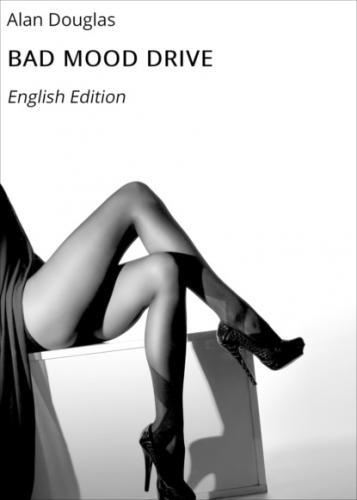29. Bad Mood Drive: Turkish Edition
ISBN-13: 978-1614000259
ISBN-10: 1614000255
BISAC: Fiction / Crime
Create Space Title ID # 6550339
30. Bad Mood Drive: Turkish-English Double Edition
ISBN-13: 978-1614000280
ISBN-10: 161400028X
BICAS: Fiction / Crime
Create Space Title ID # 6554269
2
That's the reality, if you want life to be as it was.
Donald asked, "Did you realize that we're being
followed, Mr. Stanley?"
"Yes." He already had noticed of them for the past
twenty-four hours.
The two men and the woman were dressed casually,
attempting to blend in with the summer tourists strolling
along the cobbled streets in the early morning, but it was
difficult to remain inconspicuous in a place like Monte
Carlo. It is a worldwide well known city with its Casinos,
Museums and Gardens.
Robert Stanley had first become aware of them
because they were too casual, trying too hard not to look at
him. Wherever he turned, one of them was in his
background. Robert Stanley was an easy target to follow.
He was six feet tall, with white hair lapping over his collar
and an aristocratic, almost imperious face. He was
accompanied by a strikingly lovely young blonde girl, a
pure-black German shepherd, and Donald Herman, a six-
foot four-inch bodyguard with a bulging neck and sloping
forehead. Hard to lose us, Stanley thought. He knew who
had sent them and why, and he was filled with a sense of
imminent danger. He had learned long ago to trust his
instincts. Instinct and intuition had helped make him one of
the wealthiest men in the world.
Forbes magazine estimated the value of Stanley
Enterprises at seven billion dollars, while the Fortune 500
appraised it at nine billion. The Wall Street Journal,
Barron's, and The Financial Times had all done profiles on
Robert Stanley, trying to explain his mystique, his amazing
sense of timing, the great ability that had to create the giant
Stanley Enterprises. None of them had fully succeeded to
give adequate explanation. What they all agree on was that he
had a real and substantially big manic energy. He was
inexhaustible. His philosophy was simple: A day without
making a deal was a day wasted without making money. He
was able to eliminate his competitors, his staff, and
everyone else who came in contact with him. He was a
psychic phenomenon. He was his own man, after all. He was
a religious man. He believed in God, and the God he
believed in wanted him to be rich and successful, and his
enemies dead. Robert Stanley was a public figure, and the
press knew everything about him. Robert Stanley was a
private figure, and the press knew nothing about him. They
had written about his charisma, his lavish life-style, his
private plane and his yacht, and his legendary homes in
Hawaii, Morocco, Long Island, London, the South of France,
and of course his magnificent estate, Bell Air, in West Los
Angeles. But the real Robert Stanley remained a mystery.
"Where are we going?" the woman asked. 11
He was too preoccupied to answer. The couple on the
other side of the street was using the cross switch
technique, and they had just changed partners again. Along
with his sense of danger, Stanley felt a deep anger that they
were invading his privacy. They had dared to come to his
place, his secret haven from the rest of the world.
Monaco is the second smallest independent state in the
world (after the Vatican) and is almost entirely urban.
Monte Carlo is not the capital of Monaco but a government
district. The country is divided into four areas: Monaco-Ville
(the old city), the Condamine (port quarter), Monte-Carlo
(business and recreation), and Fontvieille (recreation and
light industry). With no natural resources to exploit other
than its location and climate, the principality has become a
resort for tourists and a tax haven for businesses. Monaco is
six times the size of the Vatican and still remains the
world's most densely populated independent country.
The nearest airport is the Nice Côte-d'Azur
International, which is around 40 kilometers (24.85 miles)
away from the city-center in neighboring France. It operates
daily flights to nearly all of Europe's main cities, such as
London, Paris, Amsterdam, Rome, Brussels, Frankfurt and
Zurich. There are regular Rapides Cote D’Azur buses
connecting Monte Carlo with both the terminals at Nice
Cote-D'Azur airport, and taxis are always available outside
the terminal buildings.
Monte Carlo is easily accessed by its land borders from
France or Italy by a network of highways, most commonly
used of which is the A8 which runs west from Monte Carlo
to Nice and Marseilles, and east towards the Italian border.
Monaco-Ville is known as “le rocher” or “the rock.” It is
still a medieval village at heart and an astonishingly
picturesque site. It is made up almost entirely of pedestrian
streets and passageways and most previous century houses
still remain. There a number of hotels, restaurant and
souvenir shops tourists can stay, eat and shop at. Everybody
can also visit the Prince's Palace, the Cathedral, the
Oceanographic Museum, the City Hall, and the Saint Martin
Gardens.
